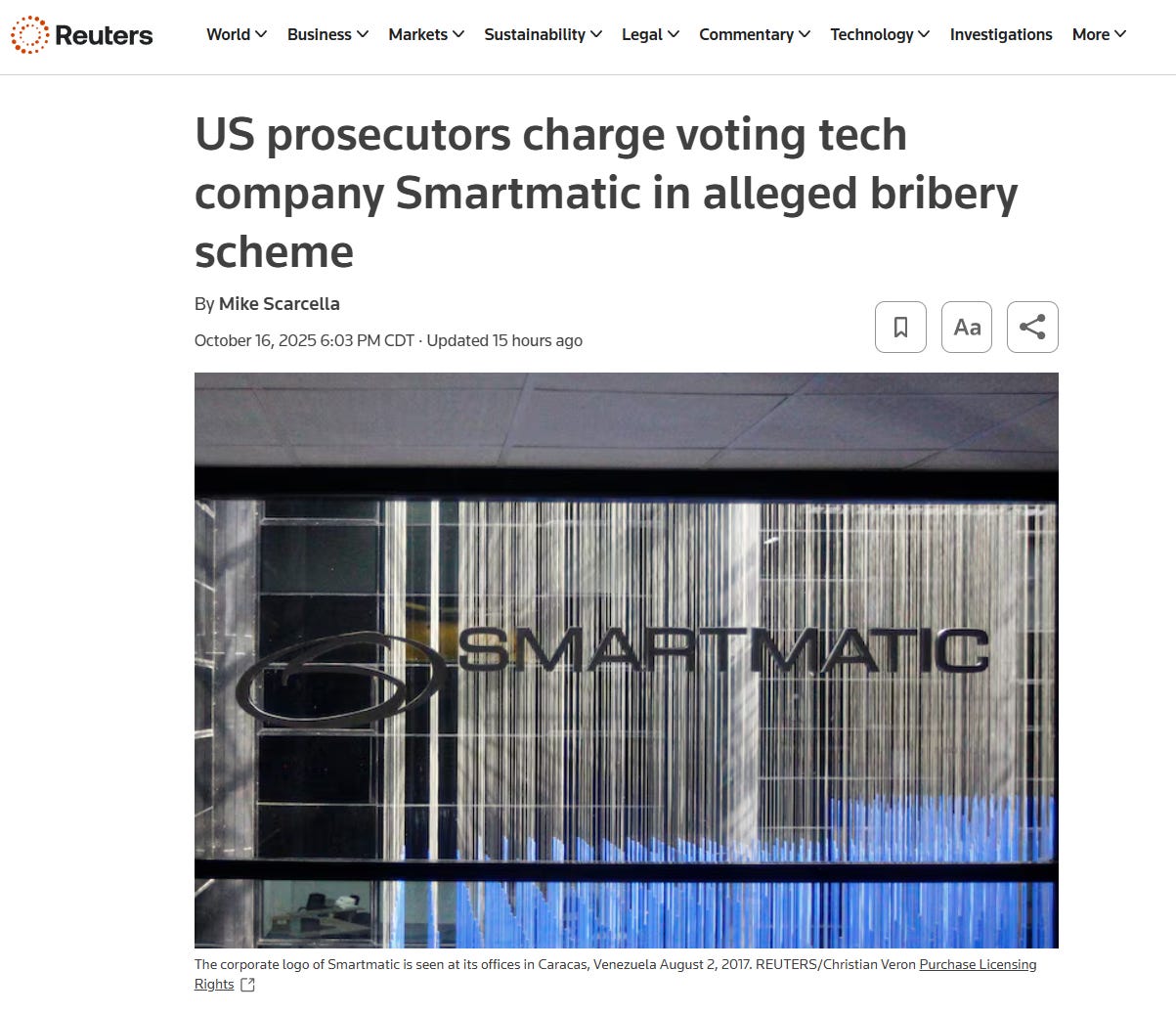Election Machine Giant Indicted for Foreign Bribery and Money Laundering
"No more pretending that those who call for common-sense reforms like voter ID and hand-countable paper ballots are the ones 'threatening' democracy."
The irony is as thick as it gets: the same voting technology company suing conservative media for billions over 2020 election coverage just got hit with criminal charges for foreign election bribery and money laundering.
U.S. prosecutors have formally charged election machine and software giant Smartmatic, and several of its former executives, in connection with a scheme to bribe a high-ranking elections official in the Philippines.
This wasn’t reported by “alternative” media, but by Reuters.
According to federal documents filed in the Southern District of Florida, the alleged conspiracy funneled over $1 million in bribes to the then-chairman of the Philippines’ Commission on Elections in exchange for favorable treatment during the 2016 election cycle. The DOJ indictment accuses Smartmatic of inflating contract costs, using coded financial language to conceal payments, and laundering the proceeds through offshore accounts.
Among those charged are Roger Alejandro Piñate Martinez, Smartmatic’s president and co-founder, along with other former company officials. All have pleaded not guilty. But this time, it’s not just rogue employees. The Justice Department has officially added Smartmatic itself as a defendant, accusing the company of violating the Foreign Corrupt Practices Act.
This would be a stunning development on its own. But the context makes it explosive. Smartmatic is the same company that has aggressively portrayed itself as a victim of election “disinformation,” currently suing Fox News for $2.7 billion over coverage of the 2020 election. They’ve painted themselves as a paragon of integrity and technological neutrality. Now they stand accused of bribing election officials in a developing country to secure contracts—then covering it up with slush funds.
In other words: the defenders of democracy were allegedly buying elections overseas.
Naturally, Smartmatic responded to the indictment by calling it political. In a statement, the company claimed the charges are “wrong on the facts and wrong on the law” and insisted the DOJ had been “misled and politically influenced by powerful interests.” Coming from the same outfit that accused U.S. networks of defaming them by merely reporting on their involvement in election systems, this amounts to a stunning display of hypocrisy.
Let’s be clear: these aren’t unsubstantiated internet rumors. This is a formal federal indictment backed by financial records, witness testimony, and documented slush funds. Yet, Smartmatic expects us to believe that somehow they’re the victims.
This is also the company that entered the 2020 election fray when it became linked (fairly or not) to controversies surrounding vote tabulation and irregularities. While Dominion Voting Systems bore the brunt of public criticism, Smartmatic’s software appeared in key jurisdictions. That scrutiny prompted Smartmatic to go on legal offense, filing defamation lawsuits against Fox News, Newsmax (settled for $40 million), and One America News (settled for an undisclosed amount).
Their message: questioning our systems is dangerous. But now that Smartmatic is the one under indictment, are we allowed to question them?
Because this scandal raises serious questions, not just about Smartmatic’s business practices, but about the entire electronic voting ecosystem.
For years, those who voiced concerns about the integrity, transparency, and chain of custody in electronic voting were mocked as ‘conspiracy theorists.’ But here we have one of the world’s largest voting tech firms federally indicted for bribing an election official to win contracts.
We were told for years that these companies were trustworthy, that the machines were secure, and that any criticism was dangerous rhetoric. Meanwhile, Smartmatic was allegedly cooking the books and greasing palms overseas.
Yet we’re still expected to believe that everything is perfectly legit with companies that hold the fate of our elections in their hands?
Of course, it’s worth pointing out that the charges relate to a foreign election. But this is precisely why we need to be vigilant. If a company will break the law in one country to get ahead, what’s stopping it elsewhere?
The solution to this conundrum is simple: Elections must be fully and independently auditable.
The only reliable audit trail is a paper one. Electronic-only systems can be manipulated, obscured, or glitched without traceable proof. But a paper ballot—hand-marked, secured, and stored—can be counted again. And again. And challenged. And verified.
That’s why states like Florida and Texas have invested heavily in paper backups. That’s why France and Germany don’t rely on machines at all. And it’s why the Smartmatic scandal is a warning shot. If we don’t restore transparency and physical accountability in our elections, we are setting ourselves up for bigger disasters.
No more black-box elections.
No more outsourcing democracy to the highest bidder.
And no more pretending that those who call for common-sense reforms like voter ID and hand-countable paper ballots are the ones “threatening” democracy.



